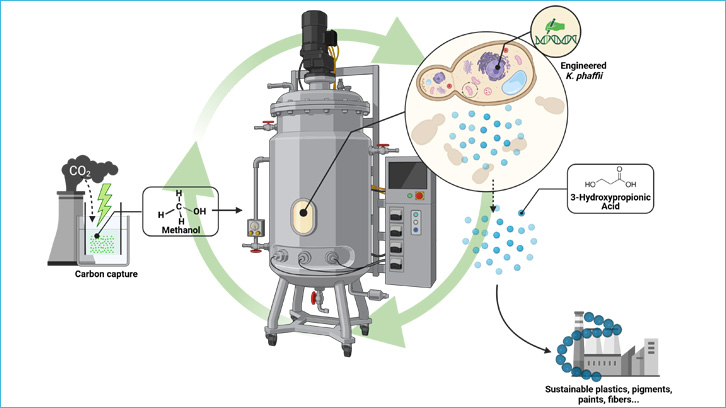Harnessing the Power of Microbes: Turning CO2 into Valuable Chemicals

Researchers from the UAB have studied how to use microbial biotechnology to address climate change by recycling CO2 from the atmosphere or industrial emissions. They have shown that genetically modified microorganism Komagataella phaffii can use methanol, obtained sustainably from CO2, as their food source and produce 3-HP, a valuable chemical. The system generated allows to turn waste into valued products.
In today’s world, reducing CO2 emissions and finding sustainable ways to use carbon-based resources are critical priorities in the fight against climate change. One promising concept is the idea of recycling CO2 into valuable chemicals that can create economic benefits, transforming the way we approach pollution. But how can something so harmful to the environment be recycled? This is where biotechnology comes into play.
In our recent study, we explored an intriguing possibility: using a special type of yeast, Komagataella phaffii, to convert methanol –a substance derived from CO2– into 3-hydroxypropionic acid (3-HP). While it might sound complicated, the basic concept is simple: we manipulated the yeast’s DNA to create a new metabolic pathway, enabling K. phaffii to feed on methanol and produce 3-HP, a valuable chemical used in making eco-friendly plastics, pigments, paints, fibers, and more.
Why use methanol?
We can turn CO2 into methanol by capturing it directly from the atmosphere or industrial emissions, like the CO2 released by a brewery, or by municipal solid waste incinerators and power plants that burn biomass or biogas to generate electricity. This happens by applying electric current, which allows transferring electrons into the CO2 atoms, converting them into methanol. Methanol is an attractive choice because it is relatively cheap and can be produced sustainably from CO2 using renewable (solar, wind) energy.
Introducing Komagataella phaffii
Some microorganisms, like K. phaffii, can use methanol as their food source. What makes this particular yeast so special is that it is already widely used in biotechnology as a cell factory to produce proteins and other useful products. So, we thought: why not see if we can reprogram this yeast to produce 3-HP from methanol?
Synthetic bioconversion of methanol into 3-HP
The challenge is that K. phaffii cells lack the tiny instructions in their DNA (known as genes) that tell them how to produce 3-HP from methanol. To tackle this, we borrowed genes from other species –even from a red beetle! –each containing the information needed to perform a crucial step in this transformation process. We then introduced these genes into our yeast, creating what we call the synthetic β-alanine pathway, essentially giving K. phaffii the new ability to produce 3-HP from methanol.
However, as amazing as that sounds, this process was no easy task. Precise genetic engineering was necessary to balance the yeast’s natural metabolism with the new pathway we introduced. We had to make sure the yeast did not get overwhelmed by the changes or start producing unwanted byproducts. After extensive experimentation, we got promising results: K. phaffii successfully converted methanol into 3-HP, marking a big step forward in CO2 revalorization.
What’s Next?
In the long run, this technology has the potential to support a more sustainable, circular economy. Not only could it help reduce CO2 emissions, but it could also give them a second life by transforming them into valuable chemicals, creating a closed-loop system that turns waste into valued products.
Despite our exciting results, there is still work to be done. Further optimization of the process is needed to make it economically viable at an industrial scale. But the potential is clear: microbial biotechnology stands as a powerful tool for addressing climate change and reducing our carbon footprint.
Department of Chemical, Biological and Environmental Engineering
Universitat Autònoma de Barcelona
References
Àvila-Cabré S, Pérez-Trujillo M, Albiol J, Ferrer P. «Engineering the synthetic β-alanine pathway in Komagataella phaffii for conversion of methanol into 3-hydroxypropionic acid». Microb Cell Fact. 2023;22:237. https://doi.org/10.1186/s12934-023-02241-9

